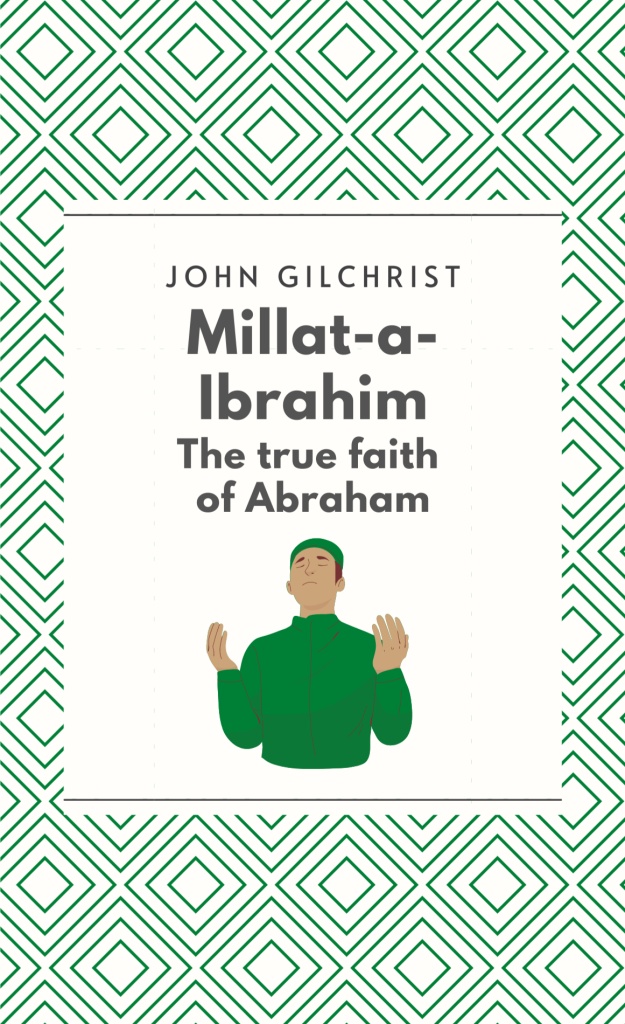The Command to Sacrifice his Son
Millat-a-Ibrahim: The True Faith of Abraham


Chapters
« Ch. 5 - The Promise of a Son to Abraham
The rejection of Ishmael came as a shock to Abraham but far worse was to follow. God was nowhere near finished with testing and proving the intensity and degree of his faith. The final and great test was about to confront him.
Just as he had watched Ishmael grow to thirteen years of age in hope of the fulfilment of the promises God had given him, only to see them dashed, so now he watched his son Isaac grow to the same age. Suddenly God again called him, "Abraham!" (Genesis 22:1). Immediately he responded "Here am I", expecting some indication of the fulfilment of God's promise that he was to have descendants as many as the stars of the sky. But God said to Abraham:
"Take your son, your only son Isaac, whom you love, and go to the land of Moriah, and offer him there as a burnt offering upon one of the mountains of which I shall show you". Genesis 22:2
This command must have shocked and bewildered Abraham. Most people regard it - quite rightly - as a supreme test of Abraham's love for God, there being nothing more precious that he could offer to him than his only son by his wife Sarah and the only one still with him, Ishmael having departed from him with Hagar many years earlier. But Abraham is marked out more as a man of faith than a man of love. God was indeed testing Abraham's love for him but it is not often realised that God was really testing his faith and was putting himself on trial before him. Less than twenty years earlier he had promised him that he would give him descendants as many as the stars of the sky through his son Isaac - how could this promise now possibly be fulfilled if Abraham was to strike him down and consume him as a burnt offering? (Both the Jewish and the Christian Scriptures state plainly that the son who was to be sacrificed was Isaac - Genesis 22:2, James 3:21 - and while the Qur'an does not say which son it was, it does confirm, in Surah 37. 101-102, that it was the son promised to him who, as we have already seen according to other Qur'anic passages, was Isaac).
Abraham could well have contemplated in his mind a gust of wind coming down on the smouldering ashes, saying to himself, "there goes the promise of God to the wind". It seemed that a pair of scissors was about to cut the string that tied the promise of a son to the promise that he would ultimately have descendants as many as the stars of the sky. The command to sacrifice appeared to cut right through these promises and hopelessly annul them. How could he have the descendants promised to him if his son Isaac was to be annihilated before he was old enough to bear offspring? If the call to reject Ishmael cane as a shock to Abraham, the command to destroy Isaac must have taxed him to the limit. What was to be his response to this command?
There were at least four possible responses. Firstly, he could have said to himself, "God has forgotten his promise". After all, men forget things and fourteen years is a long time. But Abraham had far too high an impression of God's glory to believe such a thing. God would never forget such a promise, not even in a million years. Secondly, he could have mused, "God has changed his mind". Perhaps his son was not turning out to be quite what God had hoped for and expected and he bad therefore changed his mind. Once again, however, Abraham could not entertain such thoughts. He believed that God is absolutely faithful and therefore there was no possibility that he would forego his promise.
Thirdly, he could have said to himself, "I do not know how the promise can be fulfilled if I offer my son as a sacrifice but, if God so commands, I will do it in obedience to his will. Let him resolve the dilemma". This is the spirit of fatalistic resignation, of blind faith that refuses to enquire or discover the will of God in accordance with his faithfulness. It is not true faith at all. There are millions today who believe that real faith is just simply to accept what their elders educate and bring them up to believe. To these any spirit of enquiry, any form of questioning, any willingness to doubt or critically analyse their heritage is regarded as the first step on the slippery road to unbelief.
Abraham was not such a man. He would not summarily abandon himself to the command to sacrifice his son without considerable reflection on its implications and circumstances. God put this very test of faith before him precisely because God knew that he would never see it through unless, as in the case of the birth of Isaac, he was fully convinced that it was consistent with God's faithfulness and the promise that he would have descendants like the stars of the sky.
The greatness of this man's faith is found in his refusal to simply bow to a command without understanding how it could be consistent with the absolute faithfulness of the One who gave it. God would have been most unimpressed with Abraham's attitude if he had simply said aslamtu - "I submit" - to the command to sacrifice his son without any consideration of what God's purpose was or what conciliation there was between the promises he had received and the command which now appeared to contradict and negate them completely. God wanted him to once again exercise his faith, to explore at length the harmony between this seemingly dreadful command and the eternal faithfulness of the God who gave it, for it was through precisely such reasoning that God intended to reveal to him the glory of his salvation for all mankind. This leads us to the fourth and last possible response, the only one which could reconcile the promises God had given him with the command to sacrifice his son.